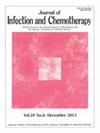A questionnaire survey for Japanese parents on intention to vaccinate their children against COVID-19 and influenza
IF 1.9
4区 医学
Q3 INFECTIOUS DISEASES
引用次数: 0
Abstract
Background
Since 2024, coronavirus (COVID-19) and influenza vaccines for children have been voluntarily administered in Japan. Evaluating parental intentions to receive these vaccinations and the reasons for vaccine hesitancy may elucidate issues regarding vaccine confidence. This study aimed to evaluate the intention of parents to vaccinate their children against COVID-19 and influenza.
Methods
A questionnaire survey was conducted between July and October 2024. Eligible participants were parents or caregivers of at least one child aged 6 months to 17 years. The questionnaire asked the parents about their intention to vaccinate their children against COVID-19 and influenza for the 2024–2025 season, before and after receiving information about the vaccines, as well as their reasons for not vaccinating.
Results
Answers from 213 parents and caregivers of 286 children were included in the study. After reading the vaccine information, 90.1 % of parents intended to vaccinate their children against influenza, while and 9.4 % intended to vaccinate against COVID-19. Of the parents or caregivers, 69.0 % indicated that they would not vaccinate their children with the COVID-19 vaccine, even if it was free. Among those refusing the COVID-19 vaccine, 77.3 % cited safety concerns as the reason for their decision.
Conclusion
The intention of parents to vaccinate their children was very high for influenza vaccination. However, only few parents intended to vaccinate their children against the COVID-19 vaccine even after providing medical information. Many parents expressed concerns about the safety of COVID-19 vaccination in children as a reason for not intending to vaccinate.
一项针对日本父母为孩子接种COVID-19和流感疫苗意向的问卷调查。
背景:自 2024 年起,日本开始自愿为儿童接种冠状病毒 (COVID-19) 和流感疫苗。评估家长接种这些疫苗的意向以及疫苗犹豫不决的原因可能会阐明有关疫苗信心的问题。本研究旨在评估家长为其子女接种 COVID-19 和流感疫苗的意向:方法:在 2024 年 7 月至 10 月期间进行了一次问卷调查。符合条件的参与者是至少有一名 6 个月至 17 岁儿童的父母或看护人。问卷询问了家长在收到有关疫苗的信息之前和之后是否打算在 2024-2025 年接种 COVID-19 和流感疫苗,以及不接种的原因:结果:286 名儿童的 213 位家长和看护人的回答被纳入研究。在阅读疫苗信息后,90.1% 的家长打算为孩子接种流感疫苗,而 9.4% 的家长打算为孩子接种 COVID-19 疫苗。69.0%的家长或看护人表示,即使 COVID-19 疫苗是免费的,他们也不会给孩子接种。在拒绝接种 COVID-19 疫苗的家长或看护人中,77.3% 的家长或看护人将安全顾虑作为做出这一决定的原因:结论:家长为子女接种流感疫苗的意愿非常高。然而,即使提供了医疗信息,也只有极少数家长愿意为其子女接种 COVID-19 疫苗。许多家长对儿童接种 COVID-19 疫苗的安全性表示担忧,并以此作为不打算接种疫苗的原因。
本文章由计算机程序翻译,如有差异,请以英文原文为准。
求助全文
约1分钟内获得全文
求助全文
来源期刊

Journal of Infection and Chemotherapy
INFECTIOUS DISEASES-PHARMACOLOGY & PHARMACY
CiteScore
4.10
自引率
4.50%
发文量
303
审稿时长
47 days
期刊介绍:
The Journal of Infection and Chemotherapy (JIC) — official journal of the Japanese Society of Chemotherapy and The Japanese Association for Infectious Diseases — welcomes original papers, laboratory or clinical, as well as case reports, notes, committee reports, surveillance and guidelines from all parts of the world on all aspects of chemotherapy, covering the pathogenesis, diagnosis, treatment, and control of infection, including treatment with anticancer drugs. Experimental studies on animal models and pharmacokinetics, and reports on epidemiology and clinical trials are particularly welcome.
 求助内容:
求助内容: 应助结果提醒方式:
应助结果提醒方式:


